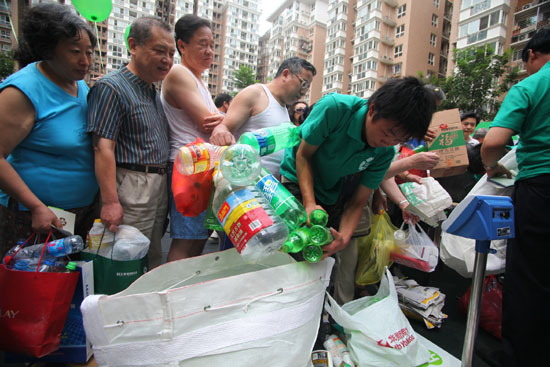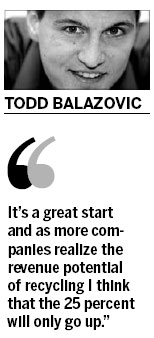Todd Balazovic
Turning garbage into cash is fresh industry for some
By Todd Balazovic (China Daily)
Updated: 2010-06-03 07:56
 |
Large Medium Small |
|
 Beijing residents hand in "rubbish" in a collection center. WANG JING / CHINA DAILY |
It's hard to live a day in Beijing without realizing trash is everywhere. Lining the streets, stuffed in crevices of couches, floating in the rivers and streams - approximately 152 million tons of it each year throughout China according to a recent report.

The study, released by Beijing-based China Science Center of the International Eurasian Academy of Sciences, went on to say that in Beijing alone more than 1,300 hectares of land, 13 million square meters, was dedicated to the detritus. And, like an unwanted tumor, it's growing fast - at a rate of 33 hectares each year, which is the size of a small city in the United States.
Weight-wise, China produces approximately 26.5 percent of the trash on the planet.
But, fear not, because the report was not pointing the finger at trash as a problem, but singling it out as a potential solution to future financial woes. With that much trash being produced, the simple introduction of a few recycling programs here and there could earn China as much as 20 billion yuan each year.
That's a lot of chuar.
While this report may have outlined future potential, it got me thinking - don't Beijingers already utilize debris as a means to make money?
One of my first observations, made after my initial week in Beijing, was that this is a city that wastes very little. Beyond the simple fact that there are waste bins for both recyclable and non-recyclable materials, something that most US cities I've lived in could learn a bit from, there is an army of people looking to make the most out of garbage.
Every ounce of rubbish is rummaged through and relieved of any odd ends that may contain potential value. Cans and bottles are collected with fervor as a means to produce extra income. Paper is piled mountain high onto the backs of electric bikes to be hauled off and hocked.
It breaths life into the phrase, "one man's trash is another's treasure".
Now imagine a world where those already sifted and sorted scraps are then thrown into a recycling plant where further value will be sought. It's a step up from releasing poisons into the air after burning it.
This fantasy may soon be realized in China, according to the report.
In Beijing alone, efforts are being made to bless the streets with more than 300 recycling bins to be filled with refuse that doesn't quite make it through the initial checks. Even more impressive are the 130 companies pushing to erect recycling plants, an industry that's growing at 25 percent each year, in order to get into the more profitable side of being eco-friendly.
It's a great start and as more companies realize the revenue potential of recycling I think that the 25 percent will only go up.
With trash turned into cash, all that's left to be figured out is how to convert Beijing's cloudy weather into currency.